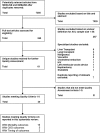Long-term prognosis after acute kidney injury (AKI): what is the role of baseline kidney function and recovery? A systematic review
- PMID: 25564144
- PMCID: PMC4289733
- DOI: 10.1136/bmjopen-2014-006497
Long-term prognosis after acute kidney injury (AKI): what is the role of baseline kidney function and recovery? A systematic review
Erratum in
-
Correction.BMJ Open. 2015 Jan 20;5(1):e006497corr1. doi: 10.1136/bmjopen-2014-006497corr1. BMJ Open. 2015. PMID: 25603919 Free PMC article. No abstract available.
Abstract
Objectives: To summarise the evidence from studies of acute kidney injury (AKI) with regard to the effect of pre-AKI renal function and post-AKI renal function recovery on long-term mortality and renal outcomes, and to assess whether these factors should be taken into account in future prognostic studies.
Design/setting: A systematic review of observational studies listed in Medline and EMBASE from 1990 to October 2012.
Participants: All AKI studies in adults with data on baseline kidney function to identify AKI; with outcomes either stratified by pre-AKI and/or post-AKI kidney function, or described by the timing of the outcomes.
Outcomes: Long-term mortality and worsening chronic kidney disease (CKD).
Results: Of 7385 citations, few studies met inclusion criteria, reported baseline kidney function and stratified by pre-AKI or post-AKI function. For mortality outcomes, three studies compared patients by pre-AKI renal function and six by post-AKI function. For CKD outcomes, two studies compared patients by pre-AKI function and two by post-AKI function. The presence of CKD pre-AKI (compared with AKI alone) was associated with doubling of mortality and a fourfold to fivefold increase in CKD outcomes. Non-recovery of kidney function was associated with greater mortality and CKD outcomes in some studies, but findings were inconsistent varying with study design. Two studies also reported that risk of poor outcome reduced over time post-AKI. Meta-analysis was precluded by variations in definitions for AKI, CKD and recovery.
Conclusions: The long-term prognosis after AKI varies depending on cause and clinical setting, but it may also, in part, be explained by underlying pre-AKI and post-AKI renal function rather than the AKI episode itself. While carefully considered in clinical practice, few studies address these factors and with inconsistent study design. Future AKI studies should report pre-AKI and post-AKI function consistently as additional factors that may modify AKI prognosis.
Keywords: EPIDEMIOLOGY; PUBLIC HEALTH.
Published by the BMJ Publishing Group Limited. For permission to use (where not already granted under a licence) please go to http://group.bmj.com/group/rights-licensing/permissions.
Figures





References
-
- Ftouh S, Lewington A; on behalf of the Acute Kidney Injury Guideline Development Group convened by the National Clinical Guidelines Centre and commissioned by the National Institute for Health and Care Excellence, in association with The Royal College of Physicians’ Clinical Effectiveness and Evaluation Unit. Prevention, detection and management of acute kidney injury: concise guideline . Clin Med 2014;14:61–5. 10.7861/clinmedicine.14-1-61 - DOI - PubMed
-
- Lewington A, Kanagasundaram S. Clinical practice guidelines. Acute kidney injury. 5th edn UK Renal Association, 2011. - PubMed
Publication types
MeSH terms
Grants and funding
LinkOut - more resources
Full Text Sources
Other Literature Sources
Medical
Miscellaneous
